IN IMAGES: Spain and EU honour Madrid train bombing victims
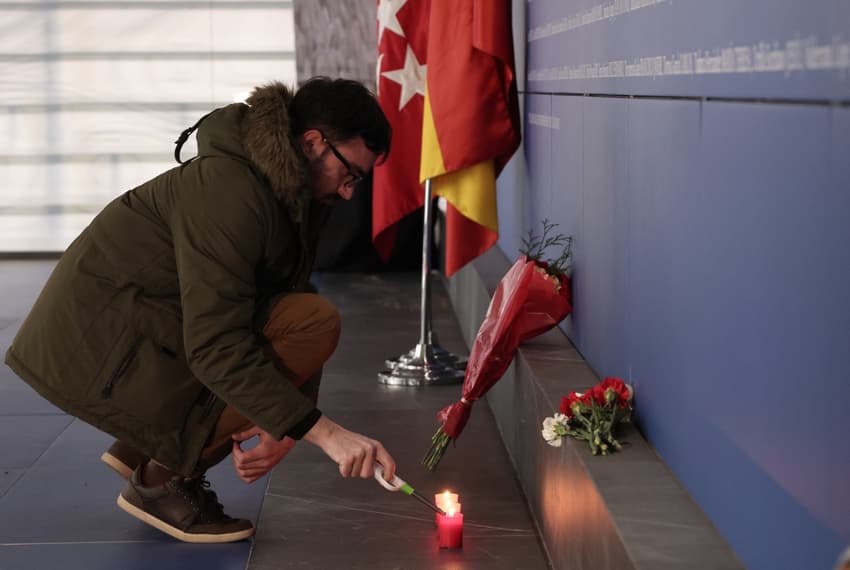
Spain and the European Union paid homage on Monday to the 192 victims of the March 11th 2004 Madrid train bombings that marked the start of mass Islamist attacks in Europe.
Spain's King Felipe VI and Queen Letizia presided over the official ceremony at the Royal Collections Gallery, a museum near the palace.
Organised by Brussels, March 11th has become the official European Day of Remembrance "for the victims of terrorism".
"This is a day of remembrance... although we cannot bring back the lives that were so violently taken.. we can and must keep their memory alive," Prime Minister Pedro Sánchez told survivors and families of the victims at an official ceremony near the royal palace.
"Anyone who has experienced such extreme violence first hand will never forget it," he said.
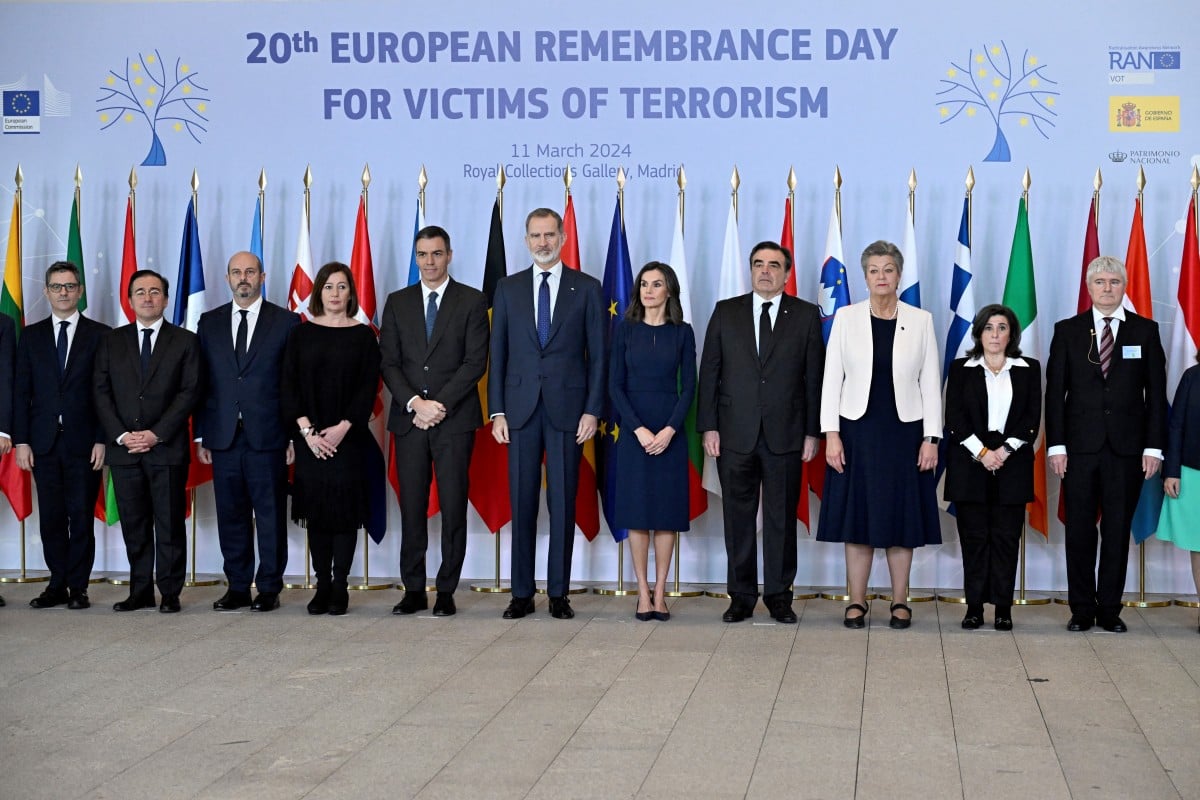
Spain's Prime Minister Pedro Sánchez (C,L), King Felipe VI, Queen Letizia (C) and Spanish and European Commission officials attend a tribute to the victims of the 11-M attacks. (Photo by JAVIER SORIANO / AFP)
Sánchez also paid tribute to the victims but also to the nearly 2,000 others hurt in the 10 explosions on four commuter trains, "who survived but whose wounds have never healed".
On that date in 2004, the Spanish capital was plunged into chaos as 10 bombs devastated four commuter trains during the early morning rush hour.
Although Spain had experienced decades of violence at the hands of the Basque separatist group ETA, it had never been hit by an attack of such magnitude, with taxi drivers and the public pitching in to help the emergency services ferry nearly 2,000 wounded to hospital.
🔴EN DIRECTO
Intervención del presidente @sanchezcastejon en el acto en conmemoración del Día Europeo en Recuerdo a las Víctimas del Terrorismo.#11M https://t.co/DG7oxGkM1k
— La Moncloa (@desdelamoncloa) March 11, 2024
City mayor José Luis Martínez Almeida described March 11, 2004 as "a day of wickedness" that had "caused immense pain and profound sadness but (...) didn't manage to bring Madrid to its knees.
El 11 de marzo de 2004 nuestra capital fue un ejemplo de entereza, solidaridad y unión. Rendimos, desde el corazón, tributo de honor a las víctimas, supervivientes y sus familias.
Fuerte no es quien no siente dolor, sino quien se levanta cada vez. Como Madrid siempre lo hará. https://t.co/nGiaeW3Uko
— José Luis Martínez-Almeida (@AlmeidaPP_) March 7, 2024
"The people of Madrid gave an example of solidarity that is still alive today," he said at an early memorial event.
Labour Minister Yolanda Díaz also recalled the sense of solidarity on that day.
"Today is the 20th anniversary of the biggest terrorist attack our country has ever suffered. I remember the feeling of fear, the silence in the streets.. and the pride of a nation that rose to the occasion," she wrote on X.
"We have not forgotten."
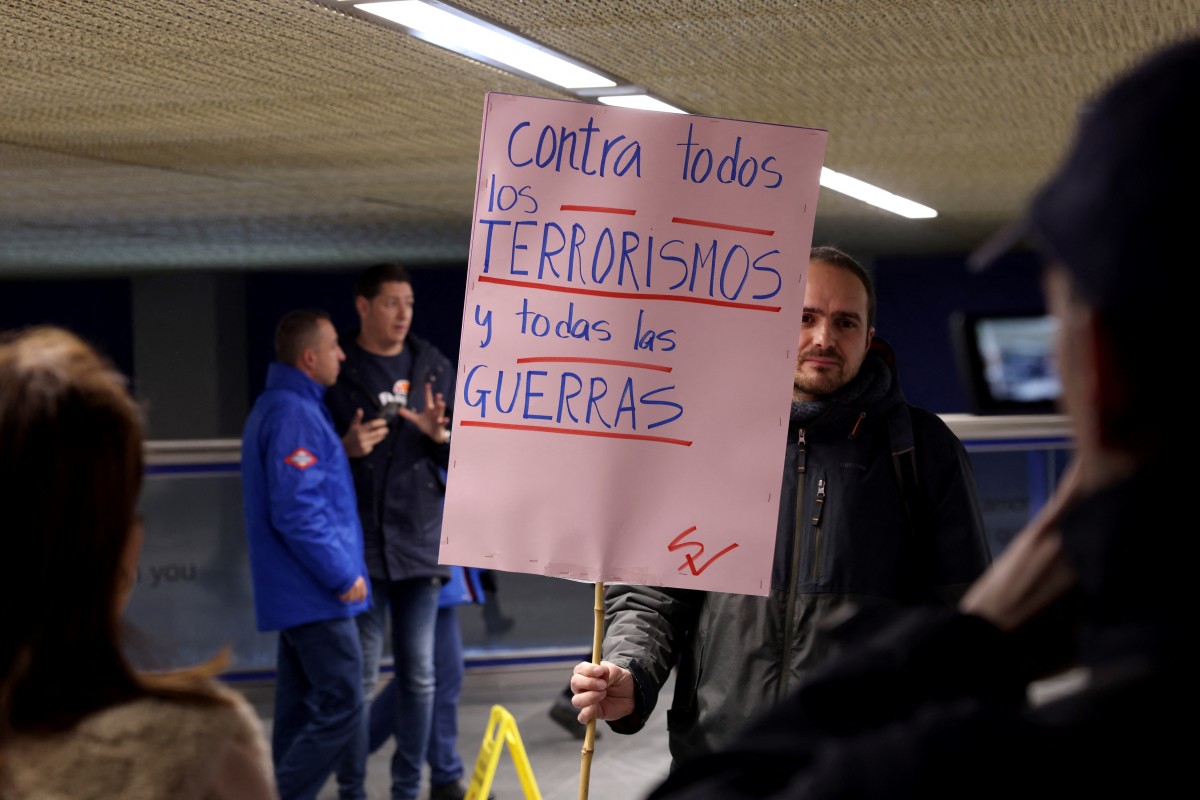
A man holds a sign reading 'Against all forms of terrorism and war' at the memorial space in Atocha station in Madrid. (Photo by Thomas COEX / AFP)
Just two-and-a-half years earlier, the United States had been hit by the 9/11 attacks in which Al-Qaeda militants had killed nearly 3,000 people, but when Madrid was hit, Europe didn't immediately think of the jihadist movement founded by Osama bin Laden.
Known as 11M - Spanish shorthand for March 11 - the attacks on a train at Atocha station and three others headed there, occurred in a highly-charged political context just days before a March 14 general election.
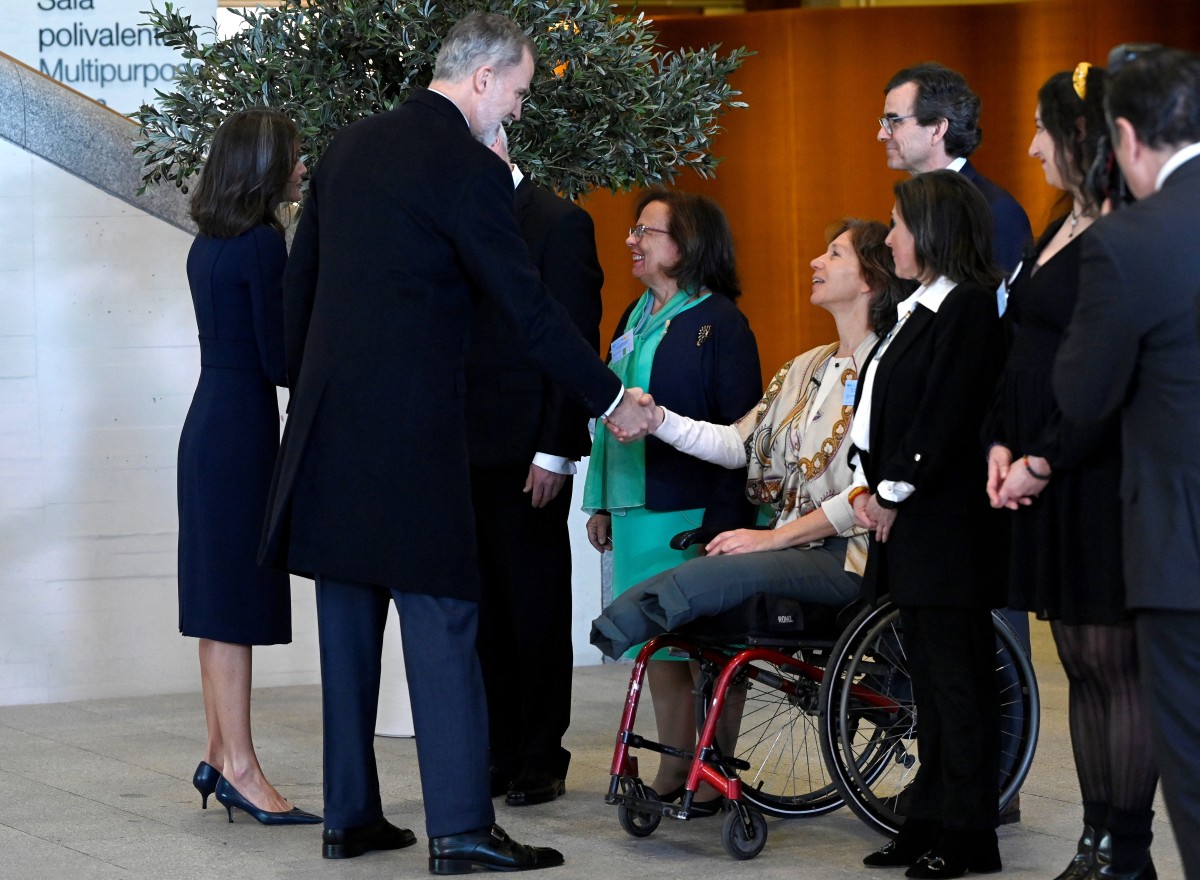
Spain's King Felipe VI meets some of the victims of the 11-M attacks at Atocha. (Photo by JAVIER SORIANO / AFP)
At the time, the ruling right-wing Popular Party (PP) of outgoing premier José María Aznar was the favourite to defeat the opposition Socialists led by José Luis Zapatero.
A year earlier, Aznar's government had decided to join the US-led invasion of Iraq, despite widespread public opposition. And in the following months, Bin Laden had threatened revenge attacks on countries supporting the invasion.
Even so, within hours of the Madrid attacks, Aznar's government publicly blamed ETA, despite mounting evidence to the contrary.
But the ETA hypothesis was soon debunked as investigators traced the perpetrators, largely through three bombs which failed to explode that were found in rucksacks and sports bags.
And Al-Qaeda claimed responsibility for the attacks saying it was in response to Spain's involvement in the Iraq war.
READ ALSO:
- 20 years since the deadliest terror attacks in Spain's history
- 'I'll never forgive them': How suffering from Madrid's 2004 bombings lingers
Although social media didn't exist, doubts over the government's version quickly spread, and during mass rallies the following day, protesters expressed hostility towards the authorities, accusing them of lying at a time when the word "disinformation" barely existed.
On March 14th, the public voted en masse, handing a resounding victory to the opposition Socialists, with analysts saying the government's disastrous handling of the attacks played a key role.
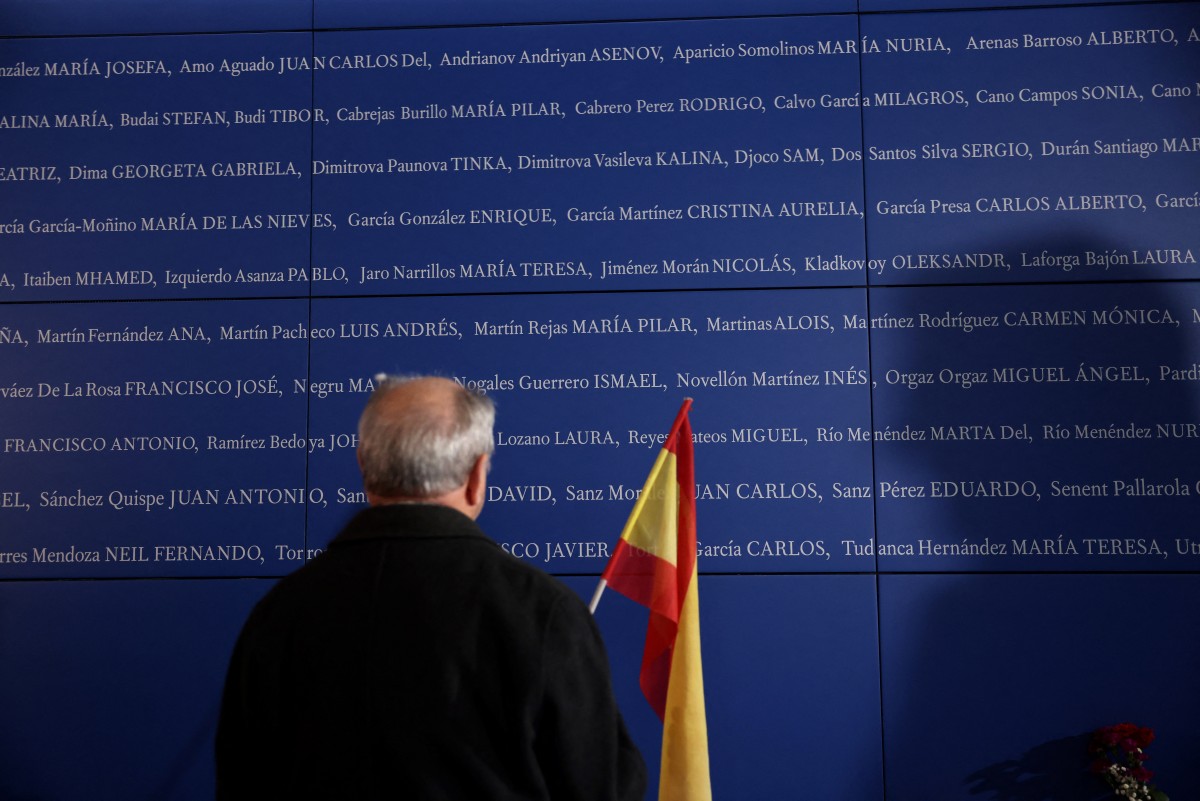
A man stands in front of a panel bearing names of the 192 victims of the 11-M attacks. (Photo by Thomas COEX / AFP)
In early April, seven suspected members of the jihadist cell involved in the carnage blew themselves up as police surrounded an apartment where they had been hiding on the southwestern outskirts of Madrid.
The blast also killed a police officer who is counted in Spain as the 193rd victim of the attacks.
After a three-year investigation, 29 suspects, the vast majority Moroccan, went on trial in early 2007 with the process lasting six months. In the end, 18 were convicted.
Twenty years later, only three are still serving time - two Moroccans who were each handed nearly 43,000 years, and a Spaniard, who supplied the explosives and was jailed for nearly 35,000 years.
In principle, they will remain behind bars until 2044.
All the others have been released after serving their sentences, the vast majority of them deported or extradited, mainly to Morocco.
Comments
See Also
Spain's King Felipe VI and Queen Letizia presided over the official ceremony at the Royal Collections Gallery, a museum near the palace.
Organised by Brussels, March 11th has become the official European Day of Remembrance "for the victims of terrorism".
"This is a day of remembrance... although we cannot bring back the lives that were so violently taken.. we can and must keep their memory alive," Prime Minister Pedro Sánchez told survivors and families of the victims at an official ceremony near the royal palace.
"Anyone who has experienced such extreme violence first hand will never forget it," he said.

Sánchez also paid tribute to the victims but also to the nearly 2,000 others hurt in the 10 explosions on four commuter trains, "who survived but whose wounds have never healed".
On that date in 2004, the Spanish capital was plunged into chaos as 10 bombs devastated four commuter trains during the early morning rush hour.
Although Spain had experienced decades of violence at the hands of the Basque separatist group ETA, it had never been hit by an attack of such magnitude, with taxi drivers and the public pitching in to help the emergency services ferry nearly 2,000 wounded to hospital.
🔴EN DIRECTO
— La Moncloa (@desdelamoncloa) March 11, 2024
Intervención del presidente @sanchezcastejon en el acto en conmemoración del Día Europeo en Recuerdo a las Víctimas del Terrorismo.#11M https://t.co/DG7oxGkM1k
City mayor José Luis Martínez Almeida described March 11, 2004 as "a day of wickedness" that had "caused immense pain and profound sadness but (...) didn't manage to bring Madrid to its knees.
El 11 de marzo de 2004 nuestra capital fue un ejemplo de entereza, solidaridad y unión. Rendimos, desde el corazón, tributo de honor a las víctimas, supervivientes y sus familias.
— José Luis Martínez-Almeida (@AlmeidaPP_) March 7, 2024
Fuerte no es quien no siente dolor, sino quien se levanta cada vez. Como Madrid siempre lo hará. https://t.co/nGiaeW3Uko
"The people of Madrid gave an example of solidarity that is still alive today," he said at an early memorial event.
Labour Minister Yolanda Díaz also recalled the sense of solidarity on that day.
"Today is the 20th anniversary of the biggest terrorist attack our country has ever suffered. I remember the feeling of fear, the silence in the streets.. and the pride of a nation that rose to the occasion," she wrote on X.
"We have not forgotten."

Just two-and-a-half years earlier, the United States had been hit by the 9/11 attacks in which Al-Qaeda militants had killed nearly 3,000 people, but when Madrid was hit, Europe didn't immediately think of the jihadist movement founded by Osama bin Laden.
Known as 11M - Spanish shorthand for March 11 - the attacks on a train at Atocha station and three others headed there, occurred in a highly-charged political context just days before a March 14 general election.

At the time, the ruling right-wing Popular Party (PP) of outgoing premier José María Aznar was the favourite to defeat the opposition Socialists led by José Luis Zapatero.
A year earlier, Aznar's government had decided to join the US-led invasion of Iraq, despite widespread public opposition. And in the following months, Bin Laden had threatened revenge attacks on countries supporting the invasion.
Even so, within hours of the Madrid attacks, Aznar's government publicly blamed ETA, despite mounting evidence to the contrary.
But the ETA hypothesis was soon debunked as investigators traced the perpetrators, largely through three bombs which failed to explode that were found in rucksacks and sports bags.
And Al-Qaeda claimed responsibility for the attacks saying it was in response to Spain's involvement in the Iraq war.
READ ALSO:
- 20 years since the deadliest terror attacks in Spain's history
- 'I'll never forgive them': How suffering from Madrid's 2004 bombings lingers
Although social media didn't exist, doubts over the government's version quickly spread, and during mass rallies the following day, protesters expressed hostility towards the authorities, accusing them of lying at a time when the word "disinformation" barely existed.
On March 14th, the public voted en masse, handing a resounding victory to the opposition Socialists, with analysts saying the government's disastrous handling of the attacks played a key role.

In early April, seven suspected members of the jihadist cell involved in the carnage blew themselves up as police surrounded an apartment where they had been hiding on the southwestern outskirts of Madrid.
The blast also killed a police officer who is counted in Spain as the 193rd victim of the attacks.
After a three-year investigation, 29 suspects, the vast majority Moroccan, went on trial in early 2007 with the process lasting six months. In the end, 18 were convicted.
Twenty years later, only three are still serving time - two Moroccans who were each handed nearly 43,000 years, and a Spaniard, who supplied the explosives and was jailed for nearly 35,000 years.
In principle, they will remain behind bars until 2044.
All the others have been released after serving their sentences, the vast majority of them deported or extradited, mainly to Morocco.
Join the conversation in our comments section below. Share your own views and experience and if you have a question or suggestion for our journalists then email us at [email protected].
Please keep comments civil, constructive and on topic – and make sure to read our terms of use before getting involved.
Please log in here to leave a comment.